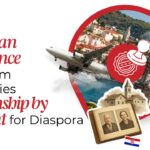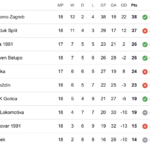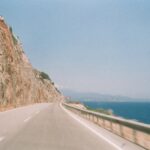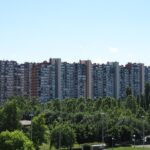“Taking a step towards overcoming disagreements.” Thus, in one sentence, the meeting was presented – a sort of détente on the relationship between HNS and Hajduk.
On the premises of HNS, on the 11th floor of the Green Gold Tower in Zagreb, representatives of the Split Club (attended by the head of the Administration Marin Brbić, and president of the Supervisory Board Benjamin Perasović) visited HNS Executive Director Marijan Kustić a few weeks back. You can read Hajduk’s description of the meeting here.
Today, however, Slobodna Dalmacija conducted an interview with Kustić about his details on May 14, 2019.
“I thank the leaders of Hajduk that have come to HNS and expressed their readiness to resolve all disputes and misunderstandings through dialogue. Our conversation was based primarily on building new relationships with honesty. We discussed the conversation in three points: we discussed reforms, development plans of HNS and, of course, the qualification match against Hungary in Split,” said Kustić.
Does asking for “wholehearted commitment to change and reform” insist on removing Damir Vrbanović and Bruno Marić from influential duties in HNS and re-establishing the Association of First League Clubs?
“We did not talk at these levels. Reform is not the move of a single man. It is a process that is felt in all the work of the Federation. The fact that since my arrival at HNS, seventy new people are involved in various commissions, as the auxiliary bodies of the Executive Committee, clearly indicate a new way of the Federation. I think that’s what the people of Hajduk accepted.”
How real is restoring the Association of First League Clubs?
“The Association of First League Clubs was abolished by the clubs themselves. They can also renew it again. HNS does not want to interfere with club relationships. The Federation can only initiate a meeting on that topic.”
Hajduk already announced specific demands, “the seven sacraments,” which they consider necessary to establish “diplomatic relations” with HNS.
“There was no talk of this at the meeting. We talked about the points I mentioned. I do not know what we will discuss at the second meeting, which should take place in Split at the end of this month, but my impression is that there is a sincere will on both sides to overcome all misunderstandings.”
Will the Euro 2020 qualifying match between Croatia and Hungary on October 10, 2019, take place in Split?
“I am very optimistic about the realization of that idea. We also organized a training match of the Croatia national team in Omiš, as a kind of return of the national team in Dalmatia.”
The Split mayor Andro Krstulović Opara also attended the HNS and Hajduk meeting. His presence, as well as the statements of state leaders, suggest that bringing the national team back to Poljud is a political issue.
“I would not say that the game in Split against Hungary is a political question. The national team playing in the second largest city in Croatia is primarily a sporting interest. I think all people in Croatia want the football team to play in Split as well. Sport is an essential segment of society because it connects and unites people.
The fact that the meeting was attended by Split mayor Andro Krstulović Opara is quite logical. The city of Split is the majority owner of Hajduk and Poljud. It is therefore quite understandable that it would be involved and take part in solving all the problems. You do not have to worry about the help of politics when you mention problems. All help should be accepted, which will enable us to make the sport better and at a higher qualitative level.”
However, building a national stadium is certainly a political issue. At what stage of the realization is the trilateral agreement between the government, the City of Zagreb and HNS regarding the “Blato project”? Recall, after the HNS Assembly, president Davor Šuker announced the idea of building a stadium in Zagreb in Blato, behind the unfinished University hospital.
“I don’t want to talk about the national stadium. This creates distress in people. HNS’s primary intentions are to represent the national team across the country, where conditions exist for that. Preferably, in modern stadiums. Therefore, HNS will support every initiative to improve infrastructure and support the construction of stadiums in Rijeka and Osijek, and renewing Poljud.
There is a problem around the stadium in Zagreb. I think Dinamo and the capital of the Republic of Croatia deserve an adequate stadium. President Šuker made a statement about the project as he is directly involved in it. If there is any news related to this project, HNS will certainly release it to the Croatian public.”
Should HNS ever build a national stadium when clubs (like Istria, Rijeka, Osijek, Dinamo…) have their own individual projects?
“The National Football Federation is not a construction company and will not build stadiums but will support any investment in infrastructure. Last year, the Federation invested in reconstructing First-League pitches, which proved to be an excellent project. Football in HNL today is much better than before.”
HNS leaders have been discussing the need for a stadium for twenty years. The last great stadium in Croatia was built forty years ago in Split for the needs of the Mediterranean Games. But when the Chinese Z-RUN consortium appeared and offered a sports complex worth 150 million euros, HNS showed no interest. Why?
“The Chinese entered business with Velika Gorica. So far, only a memorandum of cooperation has been signed. The realization of the project is a long time away. Time will show what will happen. HNS has nothing against this project. Anyway, we would love to do it. Finally, the memorandum was signed by the Football Federation of the County of Zagreb, and they are a member of HNS.”
TCN has translated excerpts from Slobodna Dalmacija, but you can read the full interview with Marijan Kustić on Slobodna Dalmacija here.
To read more about sport in Croatia, follow TCN’s dedicated page.







